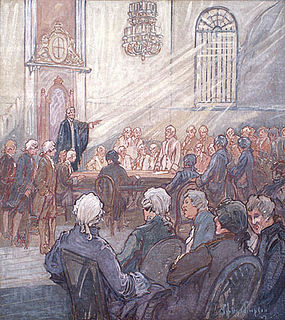Norbert Éno (September 20, 1793 – October 1, 1841) was a merchant and political figure in Lower Canada. He represented Berthier in the Legislative Assembly of Lower Canada from 1837 until the suspension of the constitution in 1838. His surname also appears as Esnault and Hénault.

The Province of Lower Canada was a British colony on the lower Saint Lawrence River and the shores of the Gulf of Saint Lawrence (1791–1841). It covered the southern portion of the current-day Province of Quebec, Canada, and the Labrador region of the modern-day Province of Newfoundland and Labrador.

The Legislative Assembly of Lower Canada was the lower house of the bicameral structure of provincial government in Lower Canada until 1838. The legislative assembly was created by the Constitutional Act of 1791. The lower house consisted of elected legislative councillors who created bills to be passed up to the Legislative Council of Lower Canada, whose members were appointed by the governor general.
He was born in Berthier, the son of Antoine Éno and Marie-Josephte Fauteux. Éno established himself in business at Saint-Cuthbert. He served as captain in the militia, later reaching the rank of major. In 1830, he was named a justice of the peace and, in 1834, a commissioner for the summary trial of small causes. Éno was elected to the assembly in an 1837 by-election held following the death of Jacques Deligny. He died at Saint-Cuthbert at the age of 48.

Saint-Cuthbert is a municipality in the Lanaudière region of Quebec, Canada, part of the D'Autray Regional County Municipality.

A justice of the peace (JP) is a judicial officer of a lower or puisne court, elected or appointed by means of a commission to keep the peace. In past centuries the term commissioner of the peace was often used with the same meaning. Depending on the jurisdiction, such justices dispense summary justice or merely deal with local administrative applications in common law jurisdictions. Justices of the peace are appointed or elected from the citizens of the jurisdiction in which they serve, and are usually not required to have any formal legal education in order to qualify for the office. Some jurisdictions have varying forms of training for JPs.
Jacques Deligny was a farmer, merchant and political figure in Lower Canada. He represented Warwick from 1814 to 1820 and from 1820 to 1830, and Berthier from 1830 to 1837.
In 1815, Éno married his cousin Geneviève Fauteux. After his death, his widow married Joseph-Édouard Faribault.
Joseph-Édouard Faribault was a notary and political figure in Lower Canada. He represented Leinster in the Legislative Assembly of Lower Canada from 1808 to 1809.






